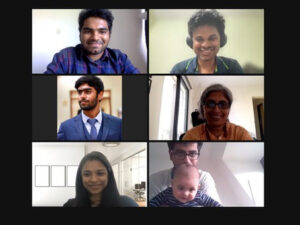The beginning of Humane Warriors was humanitarian work: providing food and other necessities to the people who needed it. However, within a few months of our Hunger Relief program, it became very clear that providing the bare necessities, while being crucial, was only scraping the surface of more deep-rooted societal problems. This led to the initialization of the Mentorship program: with the aim of better understanding how we can help underprivileged people beyond the basic necessities; how we can do more so they have the opportunities to overcome their lack of privilege and build a better future.
In my previous blog, I talked about how a Mentorship program was needed to help build a sustainable future for underprivileged kids. (https://www.humanewarriors.in/post/cost-of-dreams). Here, I follow up with the protagonists of the story: the mentor, Garvit, and his mentee, Afzal, who have been interacting for almost 6 months at the time of this writing. The following blog presents my interview with Garvit and Garvit’s interview with Afzal. In these interviews, we try to understand how the lives of mentors and mentees have been changed because of the pandemic and their involvement with the Mentorship program.
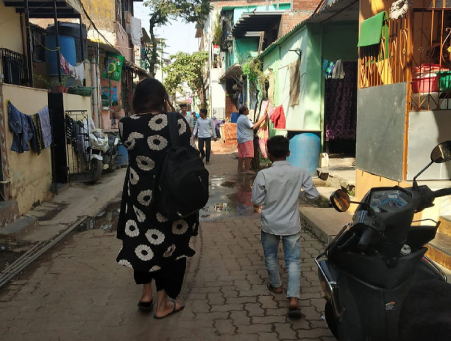
Our mentor, Garvit Bhatt, is an engineer by profession and currently working as a Financial Analyst at JP Morgan in Mumbai. Education is a cause that Garvit has been associated with for a long time. He co-founded an education-based startup with one of his colleagues to tackle education inequity in India, but had to put the venture on hold due to the pandemic. He learned about Humane Warriors through a colleague of his, and realized that this was another medium with which he could stay connected to the cause of education. Here is an excerpt from our interview:
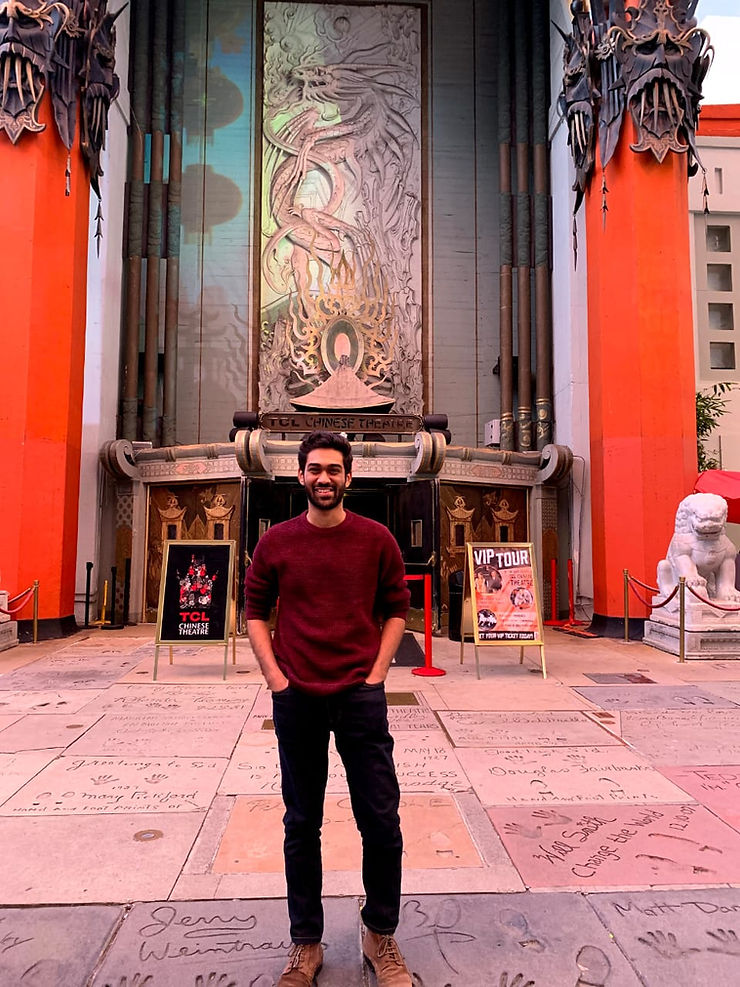
Could you tell us a little about your role as a mentor and, if you can, a little bit about your mentee too?
So I was part of the Mentorship program from the very beginning: I was part of the team of 5-6 people who helped structure the progra, define its objectives, our desired outcomes, the roles of the mentors, and the selection process for the mentors. Speaking just as a mentor, though, my role was to be a medium through which the mentee could, first, understand the purpose of the Mentorship program itself, and then use the program to reap its benefits. The term “mentor” didn’t really translate, so we started calling it the Bhaiyya-Didi (Elder brother-Sister) program so the mentees could relate to it better.
The objective was to be a constant source of support and guidance for the kid in all aspects except for tutoring them on their coursework. The idea was to understand how we could best help them, in both school and personal life, without interfering too much. We also tried to see if we could be a mediator between the kids, their school, and their parents in order to better understand their needs. These interactions turned out to be crucially beneficial: we learned that the kids were not able to sit for their exams because they couldn’t pay the fees. Then Humane Warriors stepped in to help pay the fees – and the kids could continue with their education.
So my mentee’s name is Afzal – he studies at MH School in Mumbai. He’s currently in the 9th standard, but will actually be attempting the class 10 board exams already. If he does well enough, he’ll be directly promoted to the 11th standard.
For how long have you been a Mentor now?
I think I started mentoring in December last year. I remember this because – as an icebreaker – I had asked Afzal to describe the significance of Christmas in his life.
What kind of a system do you follow as a mentor? Are there scheduled sessions for the interaction? Or can your mentee reach you at any point in time whenever they have any issues?
So yes, we do have scheduled sessions but the timetable isn’t really set in stone. We try to have at least one call per week over the weekend. The timings can be quite dynamic – sessions can last from 30 mins to more than one and half hours.
To answer your second question, I encourage him to ping me whenever he needs me. We do WhatsApp calls now and share pictures as well. After a few sessions, he mentioned that he was interested in Photoshop and wanted to try editing one of my pictures. So of course I sent him one. And we also often just exchange texts about how our day was or just random things – our interactions are quite informal in that way.
Are there specific areas that Afzal repeatedly asks for your help?
Well, Afzal is actually very sorted in his life regarding his career. When I asked him where he saw himself in 5 years, he answered with clear details. He wanted to do a bachelor’s degree and then work at a software company for a while before devoting his time to his real passion: ethical hacking.
But there were a couple of areas where he asked for my help a few times. One was on how to improve his retention or ability to memorize. I gave him some tips that I had found useful in my studies and also shared some resources and materials which might help him in his board exams. The second concern he had was regarding the details of his career progression. He had a basic outline and he knew he wanted to be an ethical hacker, but he wanted help to better understand how he could reach that goal and what resources and skills he would need.
In terms of subjects, he is very confident in Hindi and consistently gets a near-perfect score in his tests but English is something he feels he needs help with. So he suggested that maybe we could have the sessions in English. I also gave him small exercises: I would give him a topic and he would send me a 2-3 minute WhatsApp audio of him speaking on that topic in English. It could be something as basic as “Sky” or something as relevant as the farmers’ protests in India. This way, I felt, he could practice his English and stay up-to-date with current affairs.
Are there specific areas that you, as a mentor, think you need to focus more on with regards to your mentee or maybe the mentorship program in general?
So, English is definitely something a lot of these kids struggle with, so maybe we as a team can come up with something to help them in that area. As a mentor, I think I would like to work on bringing out really innovative solutions to help with the issues that the kids are facing without making it sound like an assignment or a task.
How do you keep a track of the progress or improvement of your mentee ever since you have started mentoring him?
This is something the team has been working on since the very beginning. We have our fortnightly meeting with all the mentors every month and we realized that this could be an opportunity to exchange ideas, learnings, and experiences. So, a Google Doc was created and shared with the team to record the key points after every meeting with the mentees. The document is a record of the topic of the interaction, the struggles, the techniques used by the mentor to resolve the problems the mentees are facing, and any other learning or experience that the mentors want to share with the team. The document is also a good litmus for the project coordinators to monitor if the mentors are doing their jobs.
We have also recently started a rubric evaluation system, taking inspiration from other NGOs, where we evaluate the mentee based on different parameters like interactiveness or proactiveness in completing their tasks and it gives a score from 1-5 to evaluate the progress of the mentee in various KPIs like the receptiveness of the mentee to new ideas, how self-driven they are, clarity of thought, interactiveness during the sessions, etc. As of now, the KPIs are not being shared but if there is a concern, we do talk it out with the mentees. On a more personal level, I have been giving Afzal constant feedback during our sessions regarding the things I am happy with and the things that I feel he can improve on.
What kind of tools and/or skill sets do you think have come in useful or at least helpful during your sessions with the mentee?
In terms of tools, I think just having a basic internet connection is the only essential thing required at this stage. Apart from that, what I have realized is that connecting with my mentee in informal ways (like PUBG, even) really helped break the ice in the initial stages of the program.
In terms of skills, listening is very important. These kids’ lives are very different from what we (mentors) have experienced so listening to them is crucial in order to understand their needs. I also think it’s important to have an open mind about trying different things to make this interaction more effective. Other than that, just being approachable to the mentee anytime and building a relationship where he is comfortable to share his experiences and his problems can be really helpful in the long run.
What kind of relationship do you think you and your mentee have now? Is it strictly a professional one or is he opening up to you with casual topics of conversation as well?
I think I am very blessed that way because my mentee is someone who is very open, and he has said to me that he thinks of me as a friend and not as a “Mentor”. Even though sometimes he does address me as “Sir” – which I try to discourage – I think the relationship has now developed into a friendship. He also has gone on to ask me if I am dating someone or not. So yes, we do talk about all kinds of things and have a very casual relationship in that sense.
Have you ever had instances where you needed to go beyond your professional role and advise the mentees on subjects beyond career and studies? For example, have they ever come to you with family or personal problems and asked you for advice on such matters? If so, how have you tackled them? If not, would you be willing to do so if necessary?
He has asked me a few times regarding issues other than his studies, but I think his family and his surrounding environment are quite supportive, so he doesn’t have any issues there. But yes, if ever he needs my help or support for something personal, I will always be ready to help him out.
How do you think this role as a mentor has impacted your life?
I would say the impact has been really positive! We’ve all been reading the news about how the pandemic has affected so many lives but it’s a totally different experience to personally connect with someone who is going through a struggle. This experience encouraged me to reset my perspective and also appreciate my own privilege during this pandemic. It also felt satisfying to be able to help someone out during these times. Finally, the program helped me stay connected to the topic of equitable education – which is very close to my heart.
Has there been a role reversal in your relationship with your mentee so far? Maybe something he has taught you, or a positive trait of his that you would like to pick, or an instance where he has shown you a different perspective on something?
Yes, definitely. Throughout the duration of our interaction, Afzal has said that he’s worried about his upcoming board exams. But more recently, I have seen that he has changed his worry into something more useful. He studies and doesn’t idly stress about it. He says that taking stress would only reduce his productivity – and even though I am a few years older than him, I want to have a similar attitude and clarity of thought.
What kind of mental space do you find yourself in often, at the end of each session with Afzal? Have there been specific instances where you have felt really happy or really depressed or frustrated after a session?
So, 80% of the time, I think I would say that I am satisfied thinking that I have created a positive impact on someone’s life. But yes, there are times when I feel a bit uncomfortable – but that honestly just gives me much-needed perspective. For instance, when I saw that Afzal was struggling to pay his fees of rupees 4000 to his school because of the pandemic and his family situation, it sent me into this philosophical zone, where I thought how much money does one actually require to be happy? Just to think about the imbalance that is in the world in terms of wealth and opportunity, just makes me grateful for all that I have and helps me be a better human being in many ways.
In the end, could you summarize your experiences so far with the mentorship program? And if you would like to add any other comments, please feel free to do so.
I think to summarize, this journey with the Mentorship program has been enriching in many ways and helped me understand and empathize better. So, in a way it has helped me become a better human being. Secondly, it has given me a sense of satisfaction at the end of the day, and I can sleep more peacefully. I think from my side, I will try to keep coming up with innovative solutions to mentor and help these kids so that they can get invested in the process and it can in turn help them make good career decisions and a bright future.
As for how the Mentorship program can improve, I would say that we have had quite a successful run with the program so far and I feel, this initiative should reach out to more students and more schools. Right now, we are focusing only on 9th and 10th standard students so it’s 8-9 kids that we currently mentor, but I feel that such a program should be there for more kids maybe in the neighboring community or other schools so that the kids have guidance whenever they are in need.
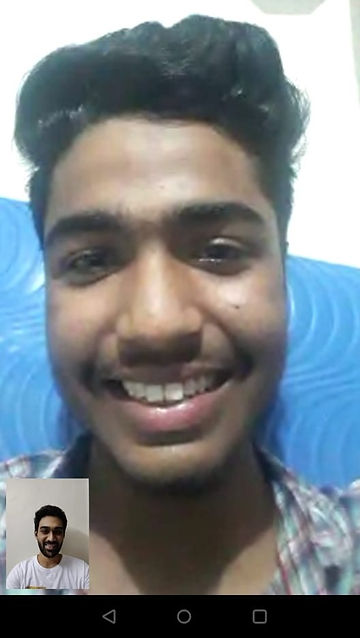
The next interview is of Afzal, who is Garvit’s mentee and is a jolly young fellow who is quite busy but was sweet enough to answer the questions that I had for him. The interview was taken by Garvit himself during one of his sessions but the honesty with which he has answered the questions is truly inspiring. (As Garvit started the interview, he gave Afzal a warning that this interview was going to be recorded. Afzal did not understand why Garvit was telling him that. So, Afzal on that day learned another lesson regarding consent).
The next interview is of Afzal, who is Gravity’s mentee and is a jolly young fellow who is quite busy but was sweet enough to answer the questions that I had for him. The interview was taken by Garvit himself during one of his sessions but the honesty with which he has answered the questions is truly inspiring. (As Garvit started the interview, he gave Afzal a warning that this interview was going to be recorded. Afzal did not understand why Garvit was telling him that. So, Afzal on that day learned another lesson regarding consent).
Could you give us a brief introduction about yourself?
My name is Afzal Mansoori and I am a 9th standard student in MH School. I live in Malwani in Mumbai. That’s all, I guess.
Where did you learn about the Mentorship program and why did you choose to be a part of it?
So Mohsin Sir had given us a form to fill in one of the WhatsApp groups but he didn’t explain much regarding the purpose of the form. A lot of people didn’t end up filling the form, but I thought, let’s fill this, maybe something good will come out of it. Then after a few days, someone from an NGO called my mother and told us about the Mentorship program. (Garvit: It was me who called your Mum.) Oh, I didn’t know that (laughs). So, then we came to know that the form was for an NGO called Humane Warriors and that’s how I came to this program.
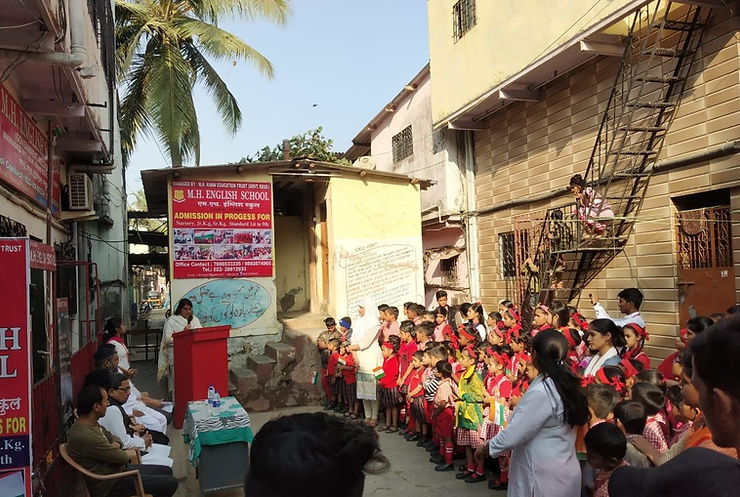
What did one day in your life look like before Corona? How has Corona changed your daily life?
It changed a lot. I can give you the example of going to school. We used to go to school every day, without a mask or a care in the world. We used to greet our friends, have fun, there was often physical contact and a sense of bonding. But after Covid restrictions were set, there was a mandatory 2 m distance that we had to maintain, we had to wear a mask every day, and it often became suffocating. Secondly, all classes have become online. Who on earth studies online!? When there is an online class, you know there is a phone next to me which is the root of all evil, I think. I get easily distracted by the phone. Or sometimes, the internet connection is weak, or slow and I miss out on what has happened in the middle. So, it’s way more difficult to follow. When classes are held in school, the teacher is right there, and my entire concentration is on what he is teaching so I follow much faster and better.
What were the things you were struggling with before Corona? How have they differed after Corona?
Conditions in the family spiraled down very quickly once the pandemic hit. My father was not getting his salary, so a lot of financial issues emerged for the family. Plus, I had to stay at home all day, so it became suffocating for me as well.

Talk to me a little about the kind of relationship you have with your mentor? Is he strictly a mentor? Or would you consider him something more, like a friend or an elder brother, or maybe a teacher or guide?
I will be totally open with you, but I enjoy these sessions with you a lot. I consider you a friend and I feel comfortable enough with you that I can even share personal things with you. I don’t have much information about you in general, you know regarding age, what is your job or anything. (Garvit: I did tell you that I was 25 years old and the name of the company I work for). You are 25 years old?? Wow! I knew you were working and about your job but didn’t know you were 25 years old. You look half the age!
Can you give me some examples of times when your mentor has helped you solve some problems you were facing? Is there any decision that you have made regarding your future with the help of what your mentor has advised you on?
The biggest help you did was regarding the fees. I remember I was in my village and it was 1 in the afternoon and I called you while standing on the terrace. You have no idea how much help that was. It was a huge load that you lifted off of me and supported my entire family during those times. That was the biggest thing anyone has done for me. Besides that, arranging for the ethical hacking workshop was amazing. I learned so much on that day.

Besides your mentor, who do you go to, to ask for help regarding any issue you are facing? Are there things that you cannot talk to anyone about? (Not specifics but in general the kind of problems)
There are two friends of mine. They are more like my brothers, to be honest. I share everything with them, small little problems, secrets, everything. The second person that I share everything with is my Mum.
What do you dream of achieving in the future or when you grow up? What do you want to achieve professionally and also personally?
I want to become a Software Engineer. But I want to keep growing and further specialize as an Ethical Hacker in the future. I am totally invested in this field and I have a lot of fun learning about things in this particular field. I love gathering knowledge about technology, computers, phones, etc. I also love using Photoshop to edit my photos and photos of my friends and family. So, yeah, anything related to gadgets and apps and computers, I am in.

I want my mother to always be happy as the first wish. Secondly, I want the wish that I never forget whatever I study or whatever knowledge I gather in life. The third wish is that my skills always keep increasing and at a fast rate and never stop increasing. I want to keep learning and keep learning fast.”
What do your parents think about the Mentorship program so far? Is there anything particular that they like? Anything that they don’t like? Anything they want to change?
There is nothing my parents would change about this program. They both are very supportive and are very happy that I am a part of this program.
What are the things you struggle with the most? How has the mentorship program and more specifically your mentor helped you in those? Do you find yourself improving in these fields now?
Let me think. (Takes a moment) Yes, I remember that I had shared with you regarding my struggle with memorizing stuff and you had given me tips and tricks to study and memorize my lessons. I follow them even now and they have been very helpful.
Have there been instances where your mentor has helped you beyond your career and studies? Maybe with a personal problem.
I think I had a lot of anger issues in the beginning, and you gave me solutions to control that as well which I have been practicing and my anger is now controlled to a large degree.
What are the things that you are afraid of or worry about most of the time? (Future? Career? Money? Family?)
My mother. I just want her to be by my side. I will manage everything else, my career, money, everything. I just want my mom to always be by my side and to hope that I can always bring her happiness in life.
If you had a genie to grant you any wish, what would you wish for?
I want my mother to always be happy as the first wish. Secondly, I want the wish that I never forget whatever I study or whatever knowledge I gather in life. The third wish is that my skills always keep increasing and at a fast rate and never stop increasing. I want to keep learning and keep learning fast.
How do you feel after every session with your mentor? Do you want to increase the frequency of these sessions or maybe have fewer sessions because of other work?
I will be very honest with you. Yeah, sometimes I do feel bored during or after the sessions because sometimes I feel I am blabbering so much and filling you up with all these problems and issues. I feel sometimes even you might feel bored. (Garvit: It has never been like this for me). But yeah, otherwise, I feel really good that I share so much with you. I feel there is always an exchange of knowledge, I learn from you and maybe sometimes, even you learn something (however minuscule) from me. (Garvit: I feel you are more knowledgeable than me, you keep on educating me about Ethical Hacking and white hat and black hat and grey hat hackers).
Would you want to also someday become a mentor to help small kids? What are some of the traits from your mentor that you would also like to have when you are a mentor? What is something you would like to change?
Of course! Why not?!
Firstly, I love your communication style. Whenever someone is rude to me or scolds me, I become very aloof. But the way you handle our sessions and the way you explain things to me, I really enjoy them, and I understand things better. I also love the way you share whatever knowledge you have with me and the way you help me in my studies. If I become a mentor someday, by God’s grace, I would like to imbibe that. If there is a little Afzal, I would love to have the same relationship with him.
As for changes, I don’t think I have any suggestions. That totally depends on you guys right, how can I suggest that with my little knowledge. But I don’t feel the need to change anything as everything is quite good and has turned out really well.
*********************************
“I had started the interviews with some biases regarding the kind of answers I would get. I had my prejudices shattered by the end of them.”
I think we, as humans, are most receptive when we communicate or have personal experiences. The interviews so far have been eye-opening for me. What I have understood from these interviews is that this Mentorship program has bridged the gap between resources and opportunities in a way that even someone with limited resources can now, through guidance, have the same opportunities. I had started the interviews with some biases regarding the kind of answers I would get. I had my prejudices shattered by the end of them. For example, I thought for the mentor, I would hear him or her speak about his or her efforts more. But what I instead caught more were the words: satisfaction, change of perspectives, a better human being. In the case of the mentees, I thought having lived with financial constraints all their lives, I would hear more about financial security, a stable career, money, etc. What I instead got was: family, skill development, knowledge, and a hunger to keep improving. I think I almost wept (and I am sure your heart broke a little too) when Afzal talked about how his foremost concern and priority is his mother and her well-being.
I think as humans we often tend to be absorbed too much in a familiar pattern of life and become so self-involved that we tend to not see the struggles of others, especially when they are hidden under a veil of laughter. We think we are alone in our struggles but only when we communicate and exchange our experiences, do we realize how similar our journeys are. These interviews have helped me break the stereotypes that we associate with people generally and look at things from a different perspective. It made me rethink my priorities in life and whether the things we are stressing about day in and day out are even worth stressing about. All in all, I realized that as much as the mentees are benefiting from this program, there is a lot of takeaway for each of us privileged individuals as well, from the simplistic outlook and clarity of thought that these mentees showcase, as we all fight these exceptional situations together.


